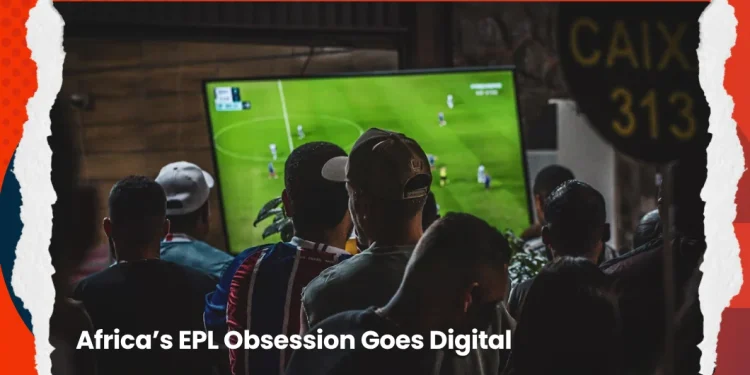Across Africa, football season means crowded viewing centres, packed living rooms, and small groups huddled around radios listening to live commentaries. Matches run late into the night, drawing entire streets together in noise and colour. This week, the English Premier League continued its group stage with Arsenal vs Crystal Palace and Manchester City vs Aston Villa. In Lagos, Cape Town, and Accra, every goal sparked the same familiar chorus of shouts and laughter.
But for a growing number of fans, watching is no longer enough. Between matches, they open mobile apps to set line-ups, swap players, and check their points. They are no longer just spectators. They are virtual managers building digital teams that mirror the real ones on the pitch.
The Rise of Fantasy Football Worldwide
Fantasy football turns ordinary fans into strategists. Users create online squads made up of real players, earning points for every assist, goal, or clean sheet those players deliver in real matches. Each week brings transfers, substitutions, and bursts of rivalry among friends.
Globally, the fantasy-sports market is now valued at about US $24.85 billion, with projections that it could reach US $56 billion by 2030. Millions play across Europe, North America, and Asia, where fantasy leagues are treated as extensions of the match-day experience. The technology has matured with live-data feeds, mobile payments, and instant updates that keep fans connected to every kick.
Now that same experience is spreading across Africa. In countries where football is already a national language, fantasy gaming feels like a natural next step. It lets fans turn passion into participation and gives African tech entrepreneurs a new field to innovate in.
Africa’s Digital Football Culture
Football in Africa has always been communal. From dusty fields to crowded living rooms, the game has long been a shared experience rather than an individual pastime. It is what fills neighbourhoods with sound on weekends and brings friends together across WhatsApp groups and community viewing centres.
Now that culture is moving online. With over 80 million fans streaming highlights, analysing stats, and competing virtually. The result is a new digital rhythm: the same cheering crowds, only this time united by screens and scoreboards.
Africa’s young population has helped drive this shift. More than 60 percent of Africans are under 25, and they are fluent in mobile culture. Fantasy football gives them a way to connect, play, and monetise their football knowledge. It turns fandom into interaction and competition, one of the defining features of Africa’s new digital entertainment economy.
The Technology Behind Fantasy Platforms
Behind the excitement sits a stack of technology that makes fantasy football possible. Platforms like FantasyFi and Sleeper Naija pull live data from global leagues using API integrations that update player stats in real time. Algorithms then convert those statistics into fantasy points, ranking thousands of users in milliseconds.
Payments are powered by fintech rails such as Paystack and Flutterwave, enabling users to enter contests or claim winnings instantly in local currencies. This combination of data and fintech makes the model scalable. Even without credit cards, African users can participate through debit cards, bank transfers, or mobile wallets.
Localisation remains a key challenge. Many platforms are still adapting to regional time zones, inconsistent internet speeds, and regulatory grey areas. Yet these same hurdles have also spurred innovation, from offline modes to lightweight app versions designed for low-data environments.
The Start-ups Building Africa’s Virtual Leagues
Across the continent, a handful of early players are shaping what the fantasy football ecosystem might look like. FantasyFi, based in Nigeria, runs daily contests that reward users with real cash prizes. The company says it aims to “bring the Premier League experience home” through technology that tracks each match minute by minute.
Another contender, Sleeper Naija, adapts a global app for Nigeria’s football market, introducing local payment gateways and regional competitions. Smaller ventures like FanBants and Fantastic.ng are also experimenting with community-driven models that combine fantasy gaming with social interaction.
These start-ups all follow the same basic revenue model; entry fees, in-app purchases, and sponsorships, but their true edge lies in local insight. They understand the cultural pull of football across Africa and are using that familiarity to turn entertainment into enterprise.
The Business and Regulatory Landscape
Fantasy football may look like a game, but behind it is a complex business. Platforms earn through entry fees, advertising, sponsorships, and in some cases, premium upgrades. A share of each contest’s pool typically goes back to the platform as commission. This model has helped fantasy sports become a multi-billion-dollar global industry.
In Africa, growth comes with extra layers of complexity. Payment systems are fragmented, and legal definitions vary from one country to another. In Nigeria, for instance, fantasy sports fall into a grey regulatory area. They are not banned, but they are not explicitly defined as skill-based gaming either. That ambiguity can slow investor confidence and make expansion across borders difficult.
Despite this, the momentum continues. The fantasy sports market across the Middle East and Africa could reach US $4.9 billion by 2030, driven largely by football’s popularity and rising smartphone use. For regulators, the challenge is to protect consumers without stifling innovation in a growing digital-sports economy.
What It Means for Africa’s Tech Ecosystem
The fantasy-football boom sits at the intersection of sports, technology, and finance. It draws on mobile payments, live data, and behavioural analytics, which are the same ingredients driving fintech and social-gaming innovation across the continent.
This proves that passion can be commercialised. It creates new opportunities in data partnerships and targeted advertising. And it signals to investors that Africa’s next growth story may come from entertainment tech rather than enterprise software.
As more African developers build localised sports-tech products, the region’s digital ecosystem becomes stronger. It shows that the infrastructure built for fintech, real-time payments, APIs, and user verification, can power other industries too.
The Virtual Stadium Is Here
On any given evening, a Lagos student might be watching a Champions League match while adjusting his fantasy line-up on his phone. A few thousand kilometres away, a Nairobi fan could be doing the same, waiting to see whether his striker earns a bonus point for an assist.
Africa’s love for football has always been collective. Now, technology is giving that community a new home. What used to happen in viewing centres and neighbourhood debates is unfolding online. Only this time, the pitch is virtual, and every fan gets to play.

















